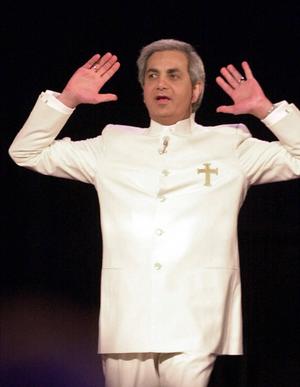I remember an episode of Friends which got me thinking, of all things. Joey defied Phoebe to commit a completely selfless act, all the while saying that none exist. Every deed done has some hint of selfishness attached to it. This troubled me. Am I and everyone else really incapable of what may be considered a truly moral gesture?
The underlying philosophical assumption in Joey's challenge was that for an act to be moral there must be nothing "in it" for the doer. The doer can gain nothing from it; only give. I've held this to be true for most of my adult life, but upon reading the surprisingly fascinating book Desiring God I am in the process of coming to vastly different conclusions. An example will help illustrate the point.
Take two husbands. No, they're not two men married to each other; they're in separate marriages. One husband buys his wife flowers for her birthday because he knows it's his duty. Nothing in him wants to do it, but he goes through with the purchase and hands his wife the flowers. He feels no gain from the deed. The other husband cannot wait to hand a bunch of flowers to his wife. He loves her passionately, and so he delights in these moments. It makes him feel terrific to be able to buy this beautiful woman a bunch of flowers for her birthday. He is consumed by love for her, and so it is his pleasure to shower her with gifts.
Whose wife will be the happier?
In times gone by I would have said "But hang on a minute. The second husband is gaining from all of this. There's nothing selfless about what he is doing. It makes him feel good, and so of course he's going to do it". But such an interjection would be missing the nature of love completely, and also the nature of morality. The greatest deeds are not done begrudgingly. They are not done with a cold heart. They overflow from a heart which delights in doing good.
Only one of the above hypothetical wives will feel loved, because only one of them is truly loved. Her gain is her husbands gain, and her loss will be her husbands loss, which is the way it is supposed to be. The first husband is a dutiful husband, but he is not a loving husband, for his affections and desires lie elsewhere.
I used to think that the height of morality was doing things we don't want to do. Of course sometimes that is required, but true morality is when we take pleasure in doing what is good and right; when our hearts desire is to see others blessed, and as Christians, to ultimately see God glorified.
John Piper calls this Christian Hedonism. It's a complicated beast with many pitfalls to be avoided, but I can't help with agree with him and be excited about the consequences.
The underlying philosophical assumption in Joey's challenge was that for an act to be moral there must be nothing "in it" for the doer. The doer can gain nothing from it; only give. I've held this to be true for most of my adult life, but upon reading the surprisingly fascinating book Desiring God I am in the process of coming to vastly different conclusions. An example will help illustrate the point.
Take two husbands. No, they're not two men married to each other; they're in separate marriages. One husband buys his wife flowers for her birthday because he knows it's his duty. Nothing in him wants to do it, but he goes through with the purchase and hands his wife the flowers. He feels no gain from the deed. The other husband cannot wait to hand a bunch of flowers to his wife. He loves her passionately, and so he delights in these moments. It makes him feel terrific to be able to buy this beautiful woman a bunch of flowers for her birthday. He is consumed by love for her, and so it is his pleasure to shower her with gifts.
Whose wife will be the happier?
In times gone by I would have said "But hang on a minute. The second husband is gaining from all of this. There's nothing selfless about what he is doing. It makes him feel good, and so of course he's going to do it". But such an interjection would be missing the nature of love completely, and also the nature of morality. The greatest deeds are not done begrudgingly. They are not done with a cold heart. They overflow from a heart which delights in doing good.
Only one of the above hypothetical wives will feel loved, because only one of them is truly loved. Her gain is her husbands gain, and her loss will be her husbands loss, which is the way it is supposed to be. The first husband is a dutiful husband, but he is not a loving husband, for his affections and desires lie elsewhere.
I used to think that the height of morality was doing things we don't want to do. Of course sometimes that is required, but true morality is when we take pleasure in doing what is good and right; when our hearts desire is to see others blessed, and as Christians, to ultimately see God glorified.
John Piper calls this Christian Hedonism. It's a complicated beast with many pitfalls to be avoided, but I can't help with agree with him and be excited about the consequences.
"Delight yourself in the LORD..." - Psalm 37:4







